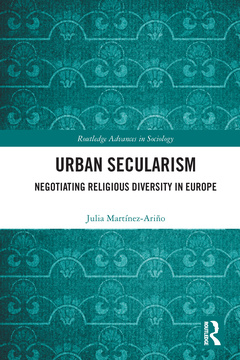Description
Urban Secularism
Negotiating Religious Diversity in Europe
Routledge Advances in Sociology Series
Author: Martínez-Ariño Julia
Language: English
Subject for Urban Secularism:
Keywords
Religious Diversity; Politico Administrative Levels; Urban Secularism; urban governance; Violating; local governance; Vivre Ensemble; secularism; Interreligious Dialogue; Multilevel governance; Deputy Mayor; Secularist actors; Assertive Secularism; Urban actors; Municipal Cemeteries; Religious Representatives; Municipal Employees; Full Face Veils; Extracurricular; Ostentatious Religious Symbols; CAPRI; Public Administration; Symbolic Policies; Agenda Carriers; SOS Racisme; City Networks; Public Policy Instruments; Urban Imaginaries; Intense Interventionism; LDH
50.12 €
In Print (Delivery period: 14 days).
Add to cartPublication date: 08-2022
Support: Print on demand
Publication date: 12-2020
· 15.6x23.4 cm · Hardback
Description
/li>Contents
/li>Biography
/li>
While French laïcité is often considered something fixed, its daily deployment is rather messy. What might we learn if we study the governance of religion from a dynamic bottom-up perspective? Using an ethnographic approach, this book examines everyday secularism in the making. How do city actors understand, frame and govern religious diversity? Which local factors play a role in those processes? In Urban Secularism: Negotiating Religious Diversity in Europe, Julia Martínez-Ariño brings the reader closer to the entrails of laïcité. She provides detailed accounts of the ways religious groups, city officials, municipal employees, secularist actors and other civil-society organisations negotiate concrete public expressions of religion.
Drawing on rich empirical material, the book demonstrates that urban actors draw and (re-)produce dichotomies of inclusion and exclusion, and challenge static conceptions of laïcité and the nation. Illustrating how urban, national and international contexts interact with one another, the book provides researchers with a deeper understanding of the multilevel governance of religious diversity.
Introudction
1. Municipal Policy Instruments Regulating Religious Diversity
2. Actor Constellations: Who is in and Who is Out?
3. Vivre Ensemble and Other "Urban Myths of Conviviality"
4. Re-Shaping laïcité: How Urban Secularism Defines Religious Normality
5. From the National to the Urban and Back: How State Secularism Travels
Conclusion: Urban Secularism and the Politics of Inclusion and Exclusion
Julia Martínez-Ariño is Assistant Professor of Sociology of Religion at the University of Groningen. She is interested in the governance of religious diversity, apostasy in Catholic countries and the heritagisation of the Jewish past.




